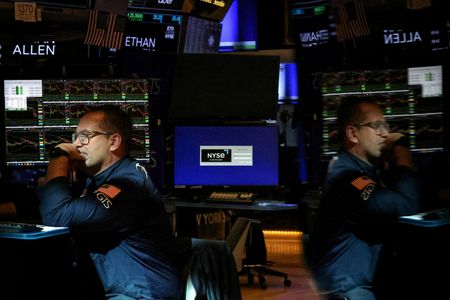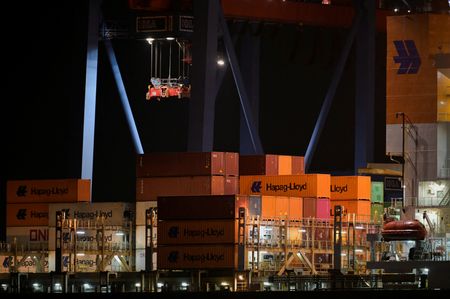By Naomi Rovnick
LONDON (Reuters) -Global investors admit to flying blind in markets roiled by erratic U.S. trade rhetoric and chaotic economic forecasting, stressing that placing long-term bets was harder now than at any time since the 2020 COVID-19 crisis.
Anxieties over whether a 90-day White House-China tariff truce will hold, plus U.S. budget gaps and whipsawing currencies have made investors extremely cautious about where to put their money.
Markets have been on a rollercoaster ride for weeks, with world stocks rallying 20% from more than one-year lows hit after U.S. President Donald Trump’s April 2 tariff bombshell, after slumping 15% in three sessions.
The turbulence continued on Friday with a sudden selloff in stocks after Trump said he was recommending a straight 50% tariff on goods from the European Union. A day earlier, government debt saw a sudden slump, spooking long-term investors out of markets that they fear have lost the anchoring force of consensus forecasts.
“There is no macroeconomic visibility,” said Francesco Sandrini, Italy CIO at Europe’s biggest asset manager Amundi.
He said he was following short-term speculative market trends instead of taking a stance on the global outlook. “You may be right on the end-game for economics and valuations in the long term but the risk is that it is going to be very painful in the short term.” Other money managers said they had shifted global portfolios onto neutral settings, which ensure the balance of investments is not tilted towards any particular scenario, because even if their views were right, assets were not trading reliably.
“There is no reward for taking any risk at the moment,” Lombard Odier Investment Managers head of macro Florian Ielpo said.
CTA hedge funds, which mirror prevailing market trends, are also not taking strong directional bets on stocks or bonds right now, J.P. Morgan data on Tuesday showed.
UNPREDICTABLE
This week, yields on 30-year U.S. Treasuries, rocketed to 5.013% from just 4.84% two weeks ago and equivalent Japanese yields hit record highs, in abrupt moves that analysts have struggled to define exact reasons for.
Earlier this month, trade war tremors also sparked a speculative buying frenzy of Taiwan’s dollar which rose 8% against the U.S. dollar in two days. John Roe, head of multi-asset funds at Britain’s biggest investor L&G, said 2020’s pandemic-induced market was “the last time things were so totally unpredictable.” He said he had briefly bought Wall Street stocks in early April, then reverted to a neutral stance on global equities and government bonds earlier this month.
Economists back in early April were inputting U.S.-China trade war scenarios into their models which produced global recession forecasts, Columbia Threadneedle Investments senior economist Anthony Willis said. Then, the White House and Beijing agreed to suspend reciprocal levies cheering markets. But the nervousness resurfaced this week after U.S. Treasury Secretary Scott Bessent threatened unspecified trading partners with maximum tariffs. “We’ve got all these scenarios and then it turns out a week later you might as well just chuck them into the bin,” Willis said.
Barclays, for example, last week scrapped its forecast for the U.S. to enter recession this year. Economic modeling following the COVID-19 was in some ways easier, said Willis, because events such as the arrival of vaccines provided “clear signals” for the economic outlook.
WHIPSAWED HSBC Asset Management global chief strategist Joe Little expected further bursts of unusual price action in “whipsawed” markets.
“This makes it very difficult (for long-term investors) in terms of running positions and maintaining conviction,” he said.
Amundi’s Sandrini said he saw the risk of markets moving in “very harmful swings,” because of debt-fuelled speculation. Flows into leveraged equity index trackers, which deploy borrowed capital in a manner that amplifies market gains and losses, hit a record high in late April as U.S. stocks surged, LSEG Lipper data showed. Citi strategists said trading in risky U.S. derivatives dubbed zero-day options, which offer cheap exposure to stock market moves and can exacerbate market routs, has also hit a record high. “The most dangerous thing that could have happened in markets was the (equity) rebound,” said Pictet Wealth Management CIO César Pérez Ruiz, arguing this had lured in amateur traders who might panic sell at the first sign of a U.S. downturn.
The Bank for International Settlements warned in March that macro-economic U.S. surprises were “inducing larger market responses abroad.” But bearish long-term investors also faced stampedes of retail investors and trend-following hedge funds moving against them each time markets turned briefly positive, Lombard Odier’s Ielpo argued. “We need to acknowledge that what we know about investing does not apply at the moment,” he said.
(Reporting by Naomi Rovnick; Additional reporting by Nell Mackenzie; Editing by Dhara Ranasinghe and Jane Merriman)











